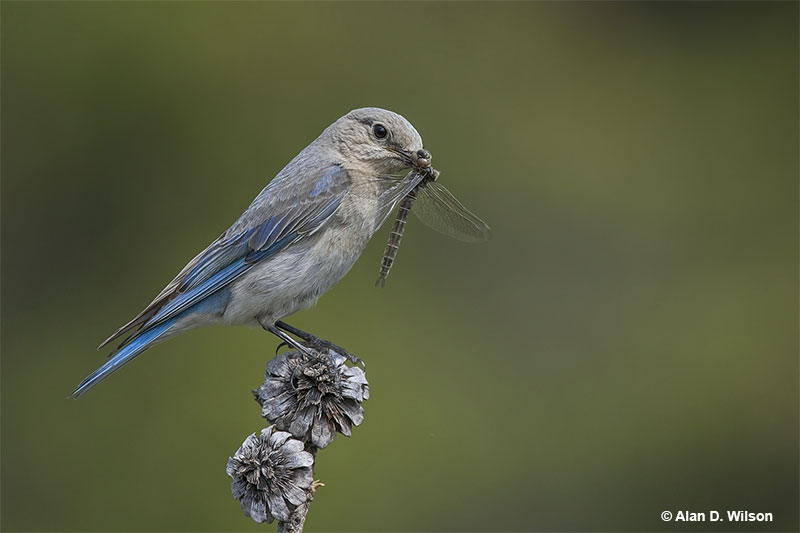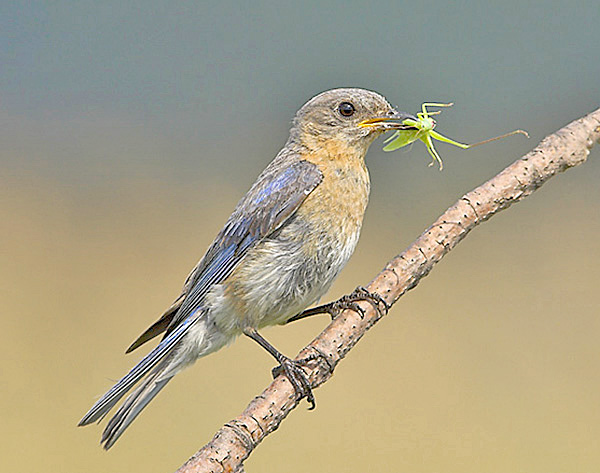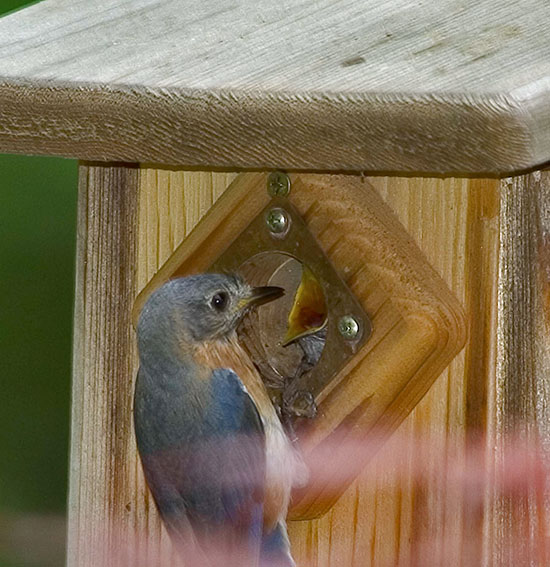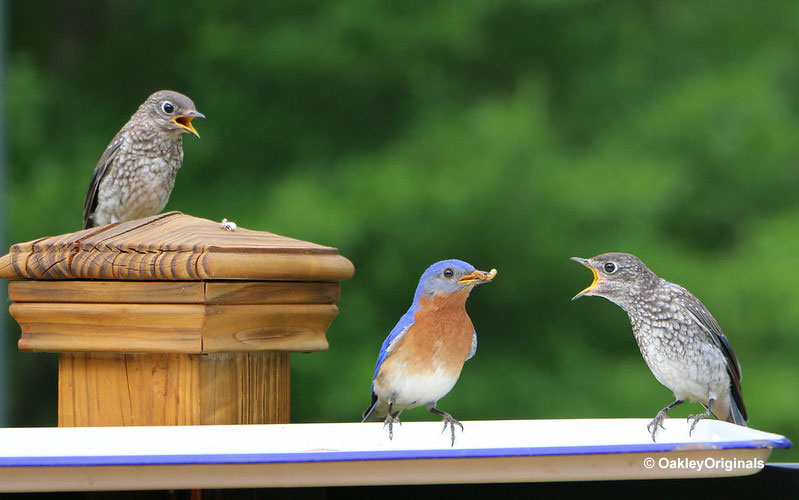
Bluebirds are some of the most beautiful birds in North America. Fortunately, we can attract them to big open lawns, and large backyards!
Feeding bluebirds is one of the easiest ways to bring them to your home. However, as with any type of bird, they aren’t going to visit unless you give them the right kind of food.
See this article to learn what bluebirds eat and how you can see more of these fantastic birds right from your window!
On this page
What Do Bluebirds Eat In The Wild?
In the wild, bluebirds (Eastern Bluebirds, Western Bluebirds, Mountain Bluebirds) shift their diet depending on the season. In general, they eat lots of insects and other arthropods in spring and summer, and small fruits in fall and winter.
Overall, their diet is pretty similar to that of American Robins and other members of the thrush family. Like other thrushes, bluebirds eat worms, but they might not feed on them as much as the larger thrushes.

Instead, they feed more on insects, such as earthworms, grasshoppers, beetles, larvae, crickets, snails, ants, and other small creatures (they can even eat smaller lizards!) living in open grassy areas.
Related: What do birds eat?
They catch them by waiting on a perch that gives them a good meadow view. When they see a bug, they fly out to catch it on the ground.
These small, pretty thrushes can also catch lots of other small creatures, even occasionally catching and eating tiny snakes!
Their insectivorous diet means that they don’t do as well in places sprayed with lots of pesticides. Bluebirds need big, open, grassy habitats with an abundance of insects.
When it gets cold, they switch to flocking together and feeding on fruit. Small groups of bluebirds fly to fruiting trees and bushes and pick berries with their beaks.
Their preferred berries and fruit include sumac, hackberries, currants, blackberries, juniper berries, elderberries, mistletoe, and the list just goes on!
What Do Bluebirds Eat At Feeders?
At feeders, bluebirds eat mealworms and bits of fruit. They won’t visit feeders with birdseed, sunflower seeds, cracked corn, or millet. Nor do they visit nectar feeders set up for hummingbirds.
Basically, their feeder diet reflects their natural, wild diet. However, even though they don’t eat as many insects in winter, they are happy to eat mealworms any time of the year. Even so, in spring and summer, they shouldn’t be fed mealworms all the time.
During nesting season, baby bluebirds need a wider variety of insects than just mealworms. If we keep a feeder full of mealworms, the adult birds might feed too much of that easy food source to their young. This can result in certain nutrient deficiencies, and the baby birds can get sick or even die.
Luckily, we can easily control the amount of mealworms that bluebirds eat; just put a few mealworms on the feeder during nesting season. After the birds raise their young, there’s no problem with filling a feeder with mealworms. Bluebirds and other species will love it, especially during the fall and winter!
During winter, a shallow dish or a tray feeder works well, but these should have some sort of roof over it (to protect from weather elements and excess moisture).
Learn more: How to attract bluebirds to your garden
Another feeder food item for bluebirds is fruit. Although they probably won’t eat them as much as mealworms, fruit can still work. Some of the better fruits for bluebirds are bits of apple, raisins, and berries.
What Do Bluebirds Feed Their Babies?
Bluebirds feed their babies lots of insects and a smaller number of fruits. To help them grow as quickly as possible, baby bluebirds eat 60% bugs and other small creatures and 35% fruit.
Both parents start feeding the babies shortly after they hatch and keep on feeding them up to three weeks after they leave the nest.
Although they will happily feed the nestlings mealworms from feeders, baby bluebirds will be healthier if they eat a wider variety of bugs.

The voracious little bluebirds eat large numbers of arthropod species that commonly live in open, grassy habitats. On occasion, they can also end up eating other small creatures like salamanders, tiny tree frogs, small snakes, and even shrews!
It all depends on what their parents bring them. So, their diet largely consists of small caterpillars, crickets, grasshoppers, different types of beetles, and katydids. They also eat a good number of spiders and various other bugs that their parents manage to catch.
In addition to arthropods, both bluebird parents feed their babies Honeysuckle berries, raspberries, Dogwood berries, and other small fruits. If suet or suet nuggets are available, they can also bring those to their young. However, as with mealworms, those should be limited while the birds are nesting.
Frequently Asked Questions
Are bluebirds good to have around?
Yes, bluebirds are good to have around. These beautiful birds eat lots of insects and are beautiful photography subjects.
What is the best food for bluebirds?
The best food for bluebirds are plenty of insects and wild berries. However, they can also be fed mealworms, suet, and chopped fruit.
Do bluebirds like bread?
No, bluebirds do not like bread. They eat mealworms, other insects, and small fruit.
Do bluebirds like oats?
No, bluebirds do not like oats. They only eat insects (including mealworms), suet, and small fruits.
Read next – Why is bluebirding important


